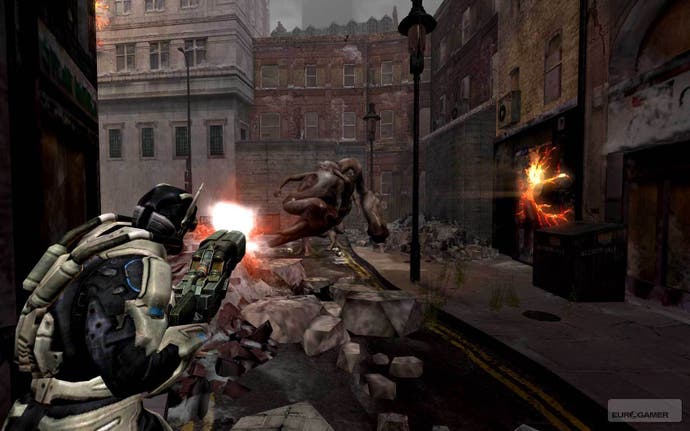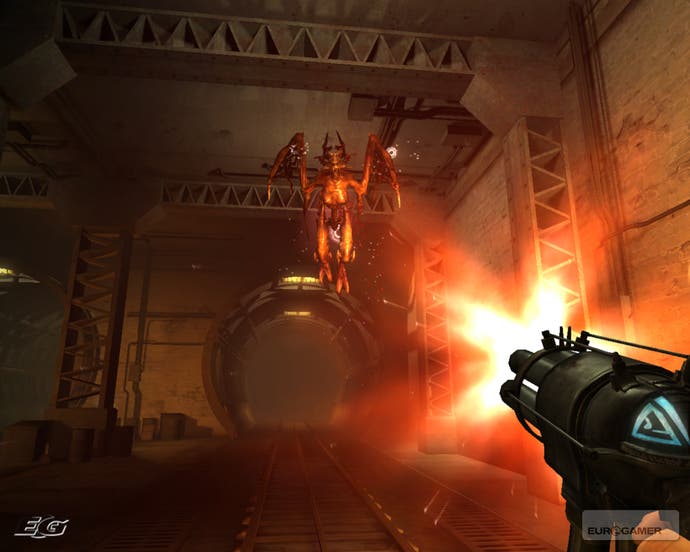Hellgate: London
Capital idea.
The once-thriving metropolis of London lies broken and devastated. Ash falls like grimy snow, drifting from the rolling smoke clouds that rise from fires that still smoulder around the city's great monuments. The terrified remnants of humanity huddle in the relative safety of the Underground, only venturing out to the streets in times of dire need, while above ground an ancient and terrible evil has taken grip of what was once the capital of an empire.
We know what you're thinking - and the answer is yes, this is a description of what's going to happen if the Tories get their clown-shoed demon in buffoon's clothing into City Hall in the next election. Mark our words. Conveniently, though, it's also the hugely atmospheric and evocative setting for Hellgate: London - a game whose value as a comedy allegory for London's mayoral election is only slightly diminished by the fact that we doubt its Californian developers could pick Boris Johnson out of a line-up of orang-utans. Never mind, eh?
There aren't very many games that we'd describe as arriving "laden with expectation", but Hellgate certainly fits the profile. Whereas many games are the overburdened of hype, a substance manufactured largely by the efforts of marketing and PR wizards, Hellgate comes with a helping of genuine expectation - a sentiment arising from the sense that the planets really ought to have aligned to make this game great.
It is, after all, the natural successor to Blizzard's Diablo series, arguably the most highly regarded action RPGs ever created. Separated from the Blizzard mothership and out on their own, the team behind Hellgate is promising a true update not only of the game, but of the genre as a whole.

What we're looking at, in theory, is a game which takes the Diablo formula and updates it with everything that's happened since Diablo - gorgeous graphics, superb online play, and countless minor advances in storytelling, user interface and the likes. Besides which, there's that premise. London burns in demonic flames, and only the combined technology and magic of the legendary Knights Templar can reclaim the city, striking from bases in Tube stations into the very depths of Hell itself. It's a geek-fantasy concept so cool that it can't walk down the street without being mistaken for Steve McQueen.
Always touch in
Unfortunately for the structure of this review, we've rather given the game away in the preceding paragraph. In theory, yes, this is a game which updates Diablo with modern sensibilities. We should now be listing all of Hellgate's failings in that regard, with a raised Roger Moore style eyebrow and a cheeky "ahh, but!" tone.
This presents a problem, because Hellgate really does what it sets out to do extremely well. The game picks up the action-RPG play of Diablo and its ilk and converts it superbly into a more modern experience - losing none of the charm or depth of the original titles along the way, and applying a modern coat of paint and some 3D polish with a deft hand.
The biggest change to the formula is that Hellgate is firmly a 3D game; in fact, the default view for characters is first-person perspective, which pulls out to a behind-the-head third-person view when you have a melee weapon equipped. Fight with a gun or other ranged weapon, and the viewpoint stays in first-person, looking for all the world like a genuine first-person shooter.

It's not, though - nor is it an action game when in third-person mode. There is no requirement for the kind of quick reactions and targeting skills that action games expect from their players. In fact, despite the fact that it resembles an action game visually, Hellgate is very solidly within the RPG genre. It has simply replaced pointing and clicking in 2D with targeting and clicking in 3D; the way you see monsters has changed but the way you fight them, fundamentally, remains the same.
The move to 3D, in other words, has affected the game less than you'd expect - but that doesn't change the fact that it makes everything in Hellgate more immediate, more visceral and more exciting than the team's previous RPGs could manage. It's not an action game, but it feels like one when it really counts; your shots, slashes and spells may just be pretty animations over the top of standard RPG mathematics, but clever use of animation and physics means that you can still slice zombies in half, or send vile lizard-like hell creatures flying with a well-placed rocket.



